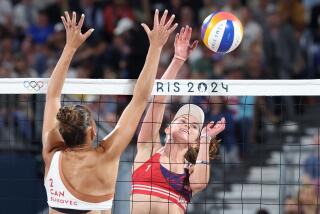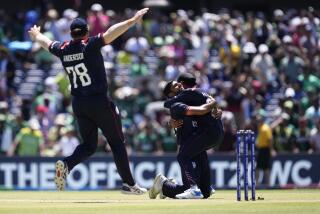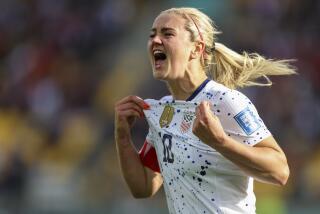Doubles Trouble for U.S. Again
- Share via
When tennis officials speak of the pageantry and tradition of Davis Cup play, they mean to evoke the image of boisterous fans and the finest players in the world competing for their countries.
In the United States, that tradition includes the collapse of an American doubles team on the middle day of the competition. Rich Leach and Jonathan Stark continued the tradition Saturday, and the U.S. held a 2-1 lead over the Netherlands going into today’s two singles matches at Palisades Tennis Club in Newport Beach.
Leach and Stark went against form for the U.S.--they are a highly ranked (No. 4) team and were eager to play Davis Cup--an unusual situation. But the day reverted to type as the Americans faced the highly experienced team of Jacco Eltingh and Paul Haarhuis, ranked No. 6.
The Dutchmen won, 6-4, 6-4, 3-6, 6-3, and gave their team a spark of hope. The loss by the American team had the opposite effect, but it did add appeal to the U.S. Tennis Assn.’s notion to provide financial incentives for American players to play doubles together.
It has been viewed as a logistically difficult proposition, but, increasingly, it appears that money is the only thing that will induce top Americans to play doubles, and play as a team.
“A lot of American teams play together for two, maybe three months, and if the results are not straightaway winning tournaments, or making a good result, they quit playing together,” Eltingh said.
Leach and Stark are the exception.
Leach is playing his first Davis Cup match in five years and at his home club. He said hewas so excited about playing that he began to choke up as the national anthem was played.
However, the Dutch team had a better response to the opportunities presented it in the 2-hour 24-minute match. The Americans converted one of eight break points, the Dutch three of seven.
As is their trademark, Eltingh and Haarhuis served well, which set the Americans back. They were often unable to engage the Dutch in meaningful rallies.
“They were serving really big,” U.S. captain Tom Gullikson said. “When two guys are serving really big like that, you are not trying to do a lot with the return, just trying to get it in play and make the guys volley a little bit.”
The colorful Dutch fans were out in force again, covered in their wall-to-wall orange: Styrofoam hats shaped like wooden shoes, sprouting ersatz tulips, Day-Glo orange braids framing orange, red, white, and blue-painted faces. Their chanting and cheering is all good-natured and their inevitable presence at Davis Cup matches around the world is only slightly marred by the knowledge that their travel is subsidized by the Dutch tennis federation.
By contrast, the local fans among the 5,216 passed the day using their hands as seat cushions. As the U.S. national soccer team has discovered, the U.S. Davis Cup team counts it as a home-court advantage when it isn’t pelted with rotten fruit upon entering the court, as happens abroad.
That thousands of American tennis fans could be rendered mute by a handful of students with noisemakers is something for tennis officials gathered here to ponder.
Another prominent fan was silent during the doubles match--Andre Agassi was busy practicing on an adjacent court while the match was played. Gullikson said court scheduling prevented Agassi from using the courts at any other time.
Agassi will have a chance to contribute to the team effort today when he plays the first singles match against Jan Siemerink. A victory by Agassi would clinch the Cup tie for the U.S.
Jim Courier will play Sjeng Schalken in the second match.
Gullikson was upbeat about his team’s chances.
“Any time you got Agassi and Courier going against two other players, whether they were from Holland or any other country, I like our chances,” Gullikson said.
It’s not far-fetched to imagine the Dutch coming back from a 2-0 deficit--they’ve already done it this year. The Netherlands came back from 2-0 against Romania in the first round.
“We are not inexperienced at comebacks, let’s put it that way,” Dutch captain Stan Franker said. “It’s going to be tough. You’re talking about Agassi and Courier. It is a tall order, but that is what top sport is all about.”
More to Read
Go beyond the scoreboard
Get the latest on L.A.'s teams in the daily Sports Report newsletter.
You may occasionally receive promotional content from the Los Angeles Times.











